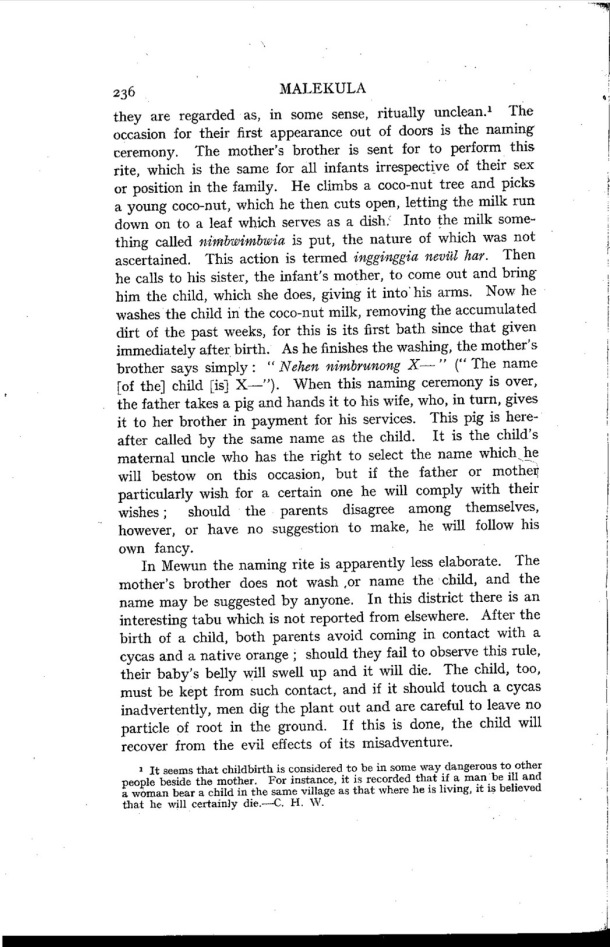|
|  [Note: this transcription was produced by an automatic OCR engine]
236 MALEKULA
they are regarded as, in some sense, ritually unclean.‘ The
oocasion for their ï¬Årst appearance out of doors is the naming
ceremony. The mother’s brother is sent for to perform this
rite, which is the same for all infants irrespective of their sex
or position in the family. He climbs a coco-nut tree and picks
a young coconut, which he then cuts open, letting the milk run
down on to a leaf which serves as a dish. Into the milk some-
thing called nimbwimbwia is put, the nature of which was not
ascertained. This action is termed mggmggia nemltl har. Then
he calls to his sister, the infant's mother, to come out and bring
him the child, which she does, giving it into'his arms. Now he
washes the child in the coco~nut milk, removing the accumulated
dirt of the past weeks, for this is its ï¬Årst bath since that given
immediately after birth. As he ï¬Ånishes the washing, the mother's
brother says simply: “ Nehen nimbrunong X— " (“ The name
[of the] child [is] X—"). When this naming ceremony is over,
the father takes a pig and hands it to his wife, who, in turn, gives
it to her brother in payment for his services. This pig is here-
after called by the same name as the child. It is the child's
maternal uncle who has the right to select the name which_he
will bestow on this occasion, but if the father or mother
particularly wish for a certain one he will comply with their
wishes ; should the parents disagree among themselves,
however, or have no suggestion to make, he will follow his
own fancy.
In Mewun the naming rite is apparently less elaborate. The
mother‘s brother does not wash ,or name the child, and the
name may be suggested by anyone. In this district there is an
interesting tabu which is not reported from elsewhere. After the
birth of a child, both parents avoid coming in contact with a
cycas and a native orange ; should they fail to observe this rule,
their baby's belly will swell up and it will die. The child, too,
must be kept from such contact, and if it should touch a cycas
inadvertently, men dig the plant out and are careful to leave no
particle of root in the ground. If this is done, the child will
recover from the evil effects of its misadventure.
' It seems that childbirth is considered to be in some way dangerous to other
people beside the mother. For instance, it is recorded that if it man_be ill and
a w0n18.n bear a child in the same village as that where he is living, it is believed
that he will certainly dic.———C. H. V.
1
r
1‘
i
|